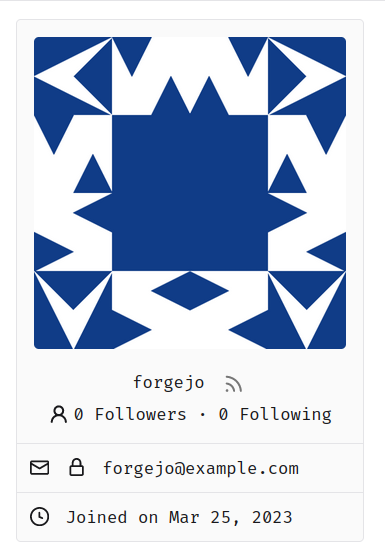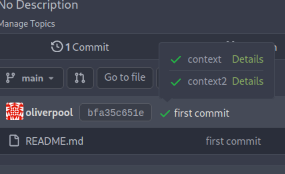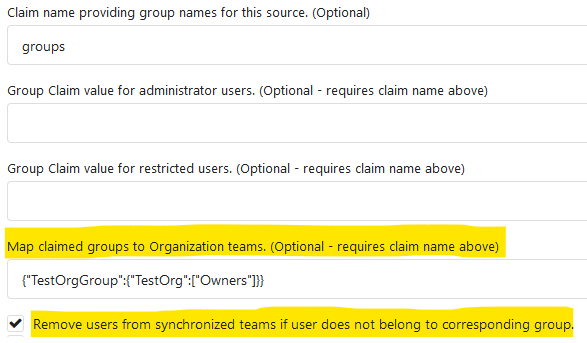(cherry picked from commit 20b5669269)
(cherry picked from commit 1574643a6a)
Update semantic version according to specification
(cherry picked from commit 22510f4130)
Mise à jour de 'Makefile'
(cherry picked from commit c3d85d8409)
(cherry picked from commit 5ea2309851)
(cherry picked from commit ec5217b9d1)
(cherry picked from commit 14f08e364b)
(cherry picked from commit b4465c67b8)
[API] [SEMVER] replace number with version
(cherry picked from commit fba48e6497)
(cherry picked from commit 532ec5d878)
[API] [SEMVER] [v1.20] less is replaced by css
(cherry picked from commit 01ca3a4f42)
(cherry picked from commit 1d928c3ab2)
(cherry picked from commit a39dc804cd)
Conflicts:
webpack.config.js
(cherry picked from commit adc68578b3)
f92e0a4018 added minio to the tests/pgsql.ini.tmpl and Forgejo CI does
not run a minio server. It will if there are external storage related
changes at some point but it is not the case now so it is not worth
the burden.
(cherry picked from commit 4cfbf4718d)
(cherry picked from commit 9bd644d601)
(cherry picked from commit 604636c7c4)
(cherry picked from commit 341cdb8540)
(cherry picked from commit 57bdc91de5)
Before, there was a `log/buffer.go`, but that design is not general, and
it introduces a lot of irrelevant `Content() (string, error) ` and
`return "", fmt.Errorf("not supported")` .
And the old `log/buffer.go` is difficult to use, developers have to
write a lot of `Contains` and `Sleep` code.
The new `LogChecker` is designed to be a general approach to help to
assert some messages appearing or not appearing in logs.
Close#24062
At the beginning, I just wanted to fix the warning mentioned by #24062
But, the cookie code really doesn't look good to me, so clean up them.
Complete the TODO on `SetCookie`:
> TODO: Copied from gitea.com/macaron/macaron and should be improved
after macaron removed.
I've heard many reports of users getting scared when they see their own
email address for their own profile, as they believe that the email
field is also visible to other users. Currently, using Incognito mode
or going over the Settings is the only "reasonable" way to verify this
from the perspective of the user.
A locked padlock should be enough to indicate that the email is not
visible to anyone apart from the user and the admins. An unlocked
padlock is used if the email address is only shown to authenticated
users.
Some additional string-related changes in the Settings were introduced
as well to ensure consistency, and the comments in the relevant tests
were improved so as to allow for easier modifications in the future.
---
#### Screenshot (EDIT: Scroll down for more up-to-date screenshots)
***Please remove this section before merging.***

This lock should only appear if the email address is explicitly hidden
using the `Hide Email Address` setting. The change was originally tested
on top of and designed for the Forgejo fork, but I don't expect any
problems to arise from this and I don't think that a
documentation-related change is strictly necessary.
---------
Co-authored-by: silverwind <me@silverwind.io>
None of the features of `unrolled/render` package is used.
The Golang builtin "html/template" just works well. Then we can improve
our HTML render to resolve the "$.root.locale.Tr" problem as much as
possible.
Next step: we can have a template render pool (by Clone), then we can
inject global functions with dynamic context to every `Execute` calls.
Then we can use `{{Locale.Tr ....}}` directly in all templates , no need
to pass the `$.root.locale` again and again.
At first, we have one unified team unit permission which is called
`Team.Authorize` in DB.
But since https://github.com/go-gitea/gitea/pull/17811, we allowed
different units to have different permission.
The old code is only designed for the old version. So after #17811, if
org users have write permission of other units, but have no permission
of packages, they can also get write permission of packages.
Co-authored-by: delvh <dev.lh@web.de>
# Why this PR comes
At first, I'd like to help users like #23636 (there are a lot)
The unclear "Internal Server Error" is quite anonying, scare users,
frustrate contributors, nobody knows what happens.
So, it's always good to provide meaningful messages to end users (of
course, do not leak sensitive information).
When I started working on the "response message to end users", I found
that the related code has a lot of technical debt. A lot of copy&paste
code, unclear fields and usages.
So I think it's good to make everything clear.
# Tech Backgrounds
Gitea has many sub-commands, some are used by admins, some are used by
SSH servers or Git Hooks. Many sub-commands use "internal API" to
communicate with Gitea web server.
Before, Gitea server always use `StatusCode + Json "err" field` to
return messages.
* The CLI sub-commands: they expect to show all error related messages
to site admin
* The Serv/Hook sub-commands (for git clients): they could only show
safe messages to end users, the error log could only be recorded by
"SSHLog" to Gitea web server.
In the old design, it assumes that:
* If the StatusCode is 500 (in some functions), then the "err" field is
error log, shouldn't be exposed to git client.
* If the StatusCode is 40x, then the "err" field could be exposed. And
some functions always read the "err" no matter what the StatusCode is.
The old code is not strict, and it's difficult to distinguish the
messages clearly and then output them correctly.
# This PR
To help to remove duplicate code and make everything clear, this PR
introduces `ResponseExtra` and `requestJSONResp`.
* `ResponseExtra` is a struct which contains "extra" information of a
internal API response, including StatusCode, UserMsg, Error
* `requestJSONResp` is a generic function which can be used for all
cases to help to simplify the calls.
* Remove all `map["err"]`, always use `private.Response{Err}` to
construct error messages.
* User messages and error messages are separated clearly, the `fail` and
`handleCliResponseExtra` will output correct messages.
* Replace all `Internal Server Error` messages with meaningful (still
safe) messages.
This PR saves more than 300 lines, while makes the git client messages
more clear.
Many gitea-serv/git-hook related essential functions are covered by
tests.
---------
Co-authored-by: delvh <dev.lh@web.de>
Closes#20955
This PR adds the possibility to disable blank Issues, when the Repo has
templates. This can be done by creating the file
`.gitea/issue_config.yaml` with the content `blank_issues_enabled` in
the Repo.
Always respect the `setting.UI.ShowUserEmail` and `KeepEmailPrivate`
setting.
* It doesn't make sense to show user's own E-mail to themself.
* Always hide the E-mail if KeepEmailPrivate=true, then the user could
know how their profile page looks like for others.
* Revert the `setting.UI.ShowUserEmail` change from #4981 . This setting
is used to control the E-mail display, not only for the user list page.
ps: the incorrect `<div .../>` tag on the profile page has been fixed by
#23748 together, so this PR becomes simpler.
* Clean the "tools" directory. The "tools" directory contains only two
files, move them.
* The "external_renderer.go" works like "cat" command to echo Stdin to
Stdout , to help testing.
* The `// gobuild: external_renderer` is incorrect, there should be no
space: `//gobuild: external_renderer`
* The `fmt.Print(os.Args[1])` is not a well-defined behavior, and it's
never used.
* The "watch.sh" is for "make watch", it's somewhat related to "build"
* After this PR, there is no "tools" directory, the project root
directory looks slightly simpler than before.
* Remove the legacy "contrib/autoboot.sh", there is no
"gogs_supervisord.sh"
* Remove the legacy "contrib/mysql.sql", it's never mentioned anywhere.
* Remove the legacy "contrib/pr/checkout.go", it has been broken for
long time, and it introduces unnecessary dependencies of the main code
base.
Follow:
* #23574
* Remove all ".tooltip[data-content=...]"
Major changes:
* Remove "tooltip" class, use "[data-tooltip-content=...]" instead of
".tooltip[data-content=...]"
* Remove legacy `data-position`, it's dead code since last Fomantic
Tooltip -> Tippy Tooltip refactoring
* Rename reaction attribute from `data-content` to
`data-reaction-content`
* Add comments for some `data-content`: `{{/* used by the form */}}`
* Remove empty "ui" class
* Use "text color" for SVG icons (a few)
Close#23444
Add `Repository` to npm package `Metadata` struct so the `repository` in
`package.json` can be stored and be returned in the endpoint.
Co-authored-by: KN4CK3R <admin@oldschoolhack.me>
`namedBlob` turned out to be a poor imitation of a `TreeEntry`. Using
the latter directly shortens this code.
This partially undoes https://github.com/go-gitea/gitea/pull/23152/,
which I found a merge conflict with, and also expands the test it added
to cover the subtle README-in-a-subfolder case.
Support to iterator subdirectory in ObjectStorage for
ObjectStorage.Iterator method.
It's required for https://github.com/go-gitea/gitea/pull/22738 to make
artifact files cleanable.
---------
Co-authored-by: Jason Song <i@wolfogre.com>
Co-authored-by: Lunny Xiao <xiaolunwen@gmail.com>
- This PR attempts to split our various DB tests into separate
pipelines.
- It splits up some of the extra feature-related tests rather than
having most of them in the MySQL test.
- It disables the race detector for some of the pipelines as well, as it
can cause slower runs and is mostly redundant when the pipelines just
swap DBs.
- It builds without SQLite support for any of the non-SQLite pipelines.
- It moves the e2e test to using SQLite rather than PG (partially
because I moved the minio tests to PG and that mucked up the test
config, and partially because it avoids another running service)
- It splits up the `go mod download` task in the Makefile from the tool
installation, as the tools are only needed in the compliance pipeline.
(Arguably even some of the tools aren't needed there, but that could be
a follow-up PR)
- SQLite is now the only arm64 pipeline, moving PG back to amd64 which
can leverage autoscaler
Should resolve#22010 - one thing that wasn't changed here but is
mentioned in that issue, unit tests are needed in the same pipeline as
an integration test in order to form a complete coverage report (at
least as far as I could tell), so for now it remains in a pipeline with
a DB integration test.
Please let me know if I've inadvertently changed something that was how
it was on purpose.
---
I will say sometimes it's hard to pin down the average time, as a
pipeline could be waiting for a runner for X minutes and that brings the
total up by X minutes as well, but overall this does seem to be faster
on average.
---------
Signed-off-by: jolheiser <john.olheiser@gmail.com>
Co-authored-by: techknowlogick <techknowlogick@gitea.io>
Add test coverage to the important features of
[`routers.web.repo.renderReadmeFile`](067b0c2664/routers/web/repo/view.go (L273));
namely that:
- it can handle looking in docs/, .gitea/, and .github/
- it can handle choosing between multiple competing READMEs
- it prefers the localized README to the markdown README to the
plaintext README
- it can handle broken symlinks when processing all the options
- it uses the name of the symlink, not the name of the target of the
symlink
Replace #23350.
Refactor `setting.Database.UseMySQL` to
`setting.Database.Type.IsMySQL()`.
To avoid mismatching between `Type` and `UseXXX`.
This refactor can fix the bug mentioned in #23350, so it should be
backported.
`renderReadmeFile` needs `readmeTreelink` as parameter but gets
`treeLink`.
The values of them look like as following:
`treeLink`: `/{OwnerName}/{RepoName}/src/branch/{BranchName}`
`readmeTreelink`:
`/{OwnerName}/{RepoName}/src/branch/{BranchName}/{ReadmeFileName}`
`path.Dir` in
8540fc45b1/routers/web/repo/view.go (L316)
should convert `readmeTreelink` into
`/{OwnerName}/{RepoName}/src/branch/{BranchName}` instead of the current
`/{OwnerName}/{RepoName}/src/branch`.
Fixes#23151
---------
Co-authored-by: Jason Song <i@wolfogre.com>
Co-authored-by: John Olheiser <john.olheiser@gmail.com>
Co-authored-by: silverwind <me@silverwind.io>
minio/sha256-simd provides additional acceleration for SHA256 using
AVX512, SHA Extensions for x86 and ARM64 for ARM.
It provides a drop-in replacement for crypto/sha256 and if the
extensions are not available it falls back to standard crypto/sha256.
---------
Signed-off-by: Andrew Thornton <art27@cantab.net>
Co-authored-by: John Olheiser <john.olheiser@gmail.com>
Since #22632, when a commit status has multiple checks, no check is
shown at all (hence no way to see the other checks).
This PR fixes this by always adding a tag with the
`.commit-statuses-trigger` to the DOM (the `.vm` is for vertical
alignment).

---------
Co-authored-by: Lunny Xiao <xiaolunwen@gmail.com>
Some bugs caused by less unit tests in fundamental packages. This PR
refactor `setting` package so that create a unit test will be easier
than before.
- All `LoadFromXXX` files has been splited as two functions, one is
`InitProviderFromXXX` and `LoadCommonSettings`. The first functions will
only include the code to create or new a ini file. The second function
will load common settings.
- It also renames all functions in setting from `newXXXService` to
`loadXXXSetting` or `loadXXXFrom` to make the function name less
confusing.
- Move `XORMLog` to `SQLLog` because it's a better name for that.
Maybe we should finally move these `loadXXXSetting` into the `XXXInit`
function? Any idea?
---------
Co-authored-by: 6543 <6543@obermui.de>
Co-authored-by: delvh <dev.lh@web.de>
Add a new "exclusive" option per label. This makes it so that when the
label is named `scope/name`, no other label with the same `scope/`
prefix can be set on an issue.
The scope is determined by the last occurence of `/`, so for example
`scope/alpha/name` and `scope/beta/name` are considered to be in
different scopes and can coexist.
Exclusive scopes are not enforced by any database rules, however they
are enforced when editing labels at the models level, automatically
removing any existing labels in the same scope when either attaching a
new label or replacing all labels.
In menus use a circle instead of checkbox to indicate they function as
radio buttons per scope. Issue filtering by label ensures that only a
single scoped label is selected at a time. Clicking with alt key can be
used to remove a scoped label, both when editing individual issues and
batch editing.
Label rendering refactor for consistency and code simplification:
* Labels now consistently have the same shape, emojis and tooltips
everywhere. This includes the label list and label assignment menus.
* In label list, show description below label same as label menus.
* Don't use exactly black/white text colors to look a bit nicer.
* Simplify text color computation. There is no point computing luminance
in linear color space, as this is a perceptual problem and sRGB is
closer to perceptually linear.
* Increase height of label assignment menus to show more labels. Showing
only 3-4 labels at a time leads to a lot of scrolling.
* Render all labels with a new RenderLabel template helper function.
Label creation and editing in multiline modal menu:
* Change label creation to open a modal menu like label editing.
* Change menu layout to place name, description and colors on separate
lines.
* Don't color cancel button red in label editing modal menu.
* Align text to the left in model menu for better readability and
consistent with settings layout elsewhere.
Custom exclusive scoped label rendering:
* Display scoped label prefix and suffix with slightly darker and
lighter background color respectively, and a slanted edge between them
similar to the `/` symbol.
* In menus exclusive labels are grouped with a divider line.
---------
Co-authored-by: Yarden Shoham <hrsi88@gmail.com>
Co-authored-by: Lauris BH <lauris@nix.lv>
To avoid duplicated load of the same data in an HTTP request, we can set
a context cache to do that. i.e. Some pages may load a user from a
database with the same id in different areas on the same page. But the
code is hidden in two different deep logic. How should we share the
user? As a result of this PR, now if both entry functions accept
`context.Context` as the first parameter and we just need to refactor
`GetUserByID` to reuse the user from the context cache. Then it will not
be loaded twice on an HTTP request.
But of course, sometimes we would like to reload an object from the
database, that's why `RemoveContextData` is also exposed.
The core context cache is here. It defines a new context
```go
type cacheContext struct {
ctx context.Context
data map[any]map[any]any
lock sync.RWMutex
}
var cacheContextKey = struct{}{}
func WithCacheContext(ctx context.Context) context.Context {
return context.WithValue(ctx, cacheContextKey, &cacheContext{
ctx: ctx,
data: make(map[any]map[any]any),
})
}
```
Then you can use the below 4 methods to read/write/del the data within
the same context.
```go
func GetContextData(ctx context.Context, tp, key any) any
func SetContextData(ctx context.Context, tp, key, value any)
func RemoveContextData(ctx context.Context, tp, key any)
func GetWithContextCache[T any](ctx context.Context, cacheGroupKey string, cacheTargetID any, f func() (T, error)) (T, error)
```
Then let's take a look at how `system.GetString` implement it.
```go
func GetSetting(ctx context.Context, key string) (string, error) {
return cache.GetWithContextCache(ctx, contextCacheKey, key, func() (string, error) {
return cache.GetString(genSettingCacheKey(key), func() (string, error) {
res, err := GetSettingNoCache(ctx, key)
if err != nil {
return "", err
}
return res.SettingValue, nil
})
})
}
```
First, it will check if context data include the setting object with the
key. If not, it will query from the global cache which may be memory or
a Redis cache. If not, it will get the object from the database. In the
end, if the object gets from the global cache or database, it will be
set into the context cache.
An object stored in the context cache will only be destroyed after the
context disappeared.
As discussed in #22847 the helpers in helpers.less need to have a
separate prefix as they are causing conflicts with fomantic styles
This will allow us to have the `.gt-hidden { display:none !important; }`
style that is needed to for the reverted PR.
Of note in doing this I have noticed that there was already a conflict
with at least one chroma style which this PR now avoids.
I've also added in the `gt-hidden` style that matches the tailwind one
and switched the code that needed it to use that.
Signed-off-by: Andrew Thornton <art27@cantab.net>
---------
Signed-off-by: Andrew Thornton <art27@cantab.net>
Co-authored-by: wxiaoguang <wxiaoguang@gmail.com>
Fixes#19555
Test-Instructions:
https://github.com/go-gitea/gitea/pull/21441#issuecomment-1419438000
This PR implements the mapping of user groups provided by OIDC providers
to orgs teams in Gitea. The main part is a refactoring of the existing
LDAP code to make it usable from different providers.
Refactorings:
- Moved the router auth code from module to service because of import
cycles
- Changed some model methods to take a `Context` parameter
- Moved the mapping code from LDAP to a common location
I've tested it with Keycloak but other providers should work too. The
JSON mapping format is the same as for LDAP.

---------
Co-authored-by: Lunny Xiao <xiaolunwen@gmail.com>